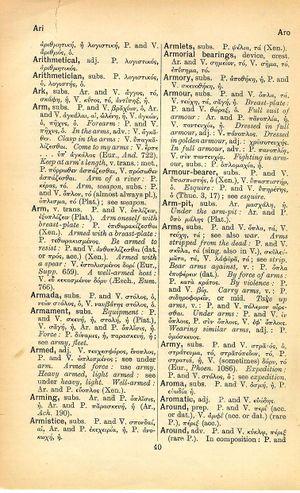arm: Difference between revisions
Πολλοὺς ὁ καιρὸς οὐκ ὄντας ποιεῖ φίλους → Occasione amicus fit, qui non fuit → Die rechte Zeit macht manchen, der's nicht ist, zum Freund
m (Text replacement - "<b class="b2">Eum.</b>" to "''Eum.''") |
(de4_1) |
||
| Line 31: | Line 31: | ||
<b class="b2">A well-armed host</b>: V. [[εὖ]] κεκασμένον [[δόρυ]] (Aesch., ''Eum.'' 766). | <b class="b2">A well-armed host</b>: V. [[εὖ]] κεκασμένον [[δόρυ]] (Aesch., ''Eum.'' 766). | ||
}} | |||
{{GermanLatin | |||
|dela=arm, I) [[nicht]] [[reich]]: [[pauper]] (der [[nur]] [[sein]] notdürftiges Auskommen hat, sich [[einschränken]] muß, Ggstz. [[dives]] [[oder]] [[qui]] habet). – [[tenuis]] (dem die Glücksgüter [[nur]] [[dünn]], [[spärlich]] zugemessen sind, Ggstz. [[locuples]]). – [[egens]] od. [[indigens]] (der an notwendigen [[oder]] [[doch]] an [[unentbehrlich]] gewordenen Bedürfnissen [[Mangel]] leidet, Ggstz. [[abundans]], [[locuples]], [[dives]]); verb. [[tenuis]] [[atque]] [[egens]]. – [[inops]] ([[hilflos]] u. [[hilfsbedürftig]], Ggstz. [[opulentus]]). – mendīcus ([[bettelarm]], Ggstz. [[dives]], [[opulentus]], opulentissimus). – [[etwas]] [[arm]], [[pauperculus]]: [[sehr]], [[ganz]] a., [[perpauper]]; egentissimus; omnibus rebus [[egens]]; [[cui]] [[minus]] [[nihilo]] [[est]]; nullarum opum [[dominus]] (v. einem Volke). – [[ein]] Armer ([[ein]] armer [[Mann]]), [[vir]] [[pauper]]; [[pauper]] [[quidam]]. – die Armen (die armen [[Leute]]), pauperes etc.; [[tenuis]] vitae homines – (die [[ein]] spärliches Auskommen [[haben]]). – die Ärmeren, tenuiores (Ggstz. locupletiores). – a. [[sein]], in egestate [[esse]] [[oder]] versari; vgl. »in [[Armut]] [[leben]]« [[unter]] »[[Armut]]«: [[sehr]], [[ganz]] a. [[sein]], in [[summa]] egestate, mendicitate [[esse]]; omnium rerum inopem [[esse]]; [[nihil]] habere: a. [[werden]], egentem fieri; ad inopiam redigi: jmd. a. [[machen]], egestatem alci afferre; ad inopiam alqm redigere; ad mendicitatem alqm detrudere (an den Bettelstab [[bringen]]): [[einen]] Armen [[reich]] [[machen]]. egentem divitem facere; locupletem ex egenti efficere: tenuiorem locu pletare. – II) [[Mangel]] an [[etwas]] habend: [[inops]] alcis [[rei]] od. alqā re od. ab alqa re. – [[sterilis]] alcis [[rei]] [[oder]] ab alqa re (an [[etwas]] [[nicht]] [[fruchtbar]], [[von]] [[etwas]] [[leer]]). – [[privatus]] od. [[spoliatus]] alqā re ([[einer]] [[Sache]] beraubt). – eine a. [[Sprache]], [[inops]] [[lingua]]: a. an Wörtern, s. [[wortarm]]: a. an Worten, an [[Unterhaltung]], s. [[wortkarg]]. – III) [[unglücklich]]: [[miser]]. [[misellus]]. – [[infelix]] ([[unglücklich]]). – [[miserandus]] ([[bemitleidenswert]]). – [[ein]] a. [[Schelm]], [[homo]] [[misellus]]. – Adv.[[misere]]; [[infeliciter]]. | |||
}} | }} | ||
Revision as of 09:48, 15 August 2017
English > Greek (Woodhouse)
subs.
P. and V. βραχίων, ὁ, Ar. and V. ἀγκάλαι, αἱ, ὠλένη, ἡ, V. ἀγκών, ὁ, πῆχυς, ὁ.
Forearm: P. and V. πῆχυς, ὁ.
In the arms, adv.: V. ἄγκαθεν.
Clasp in the arms: V. ὑπαγκαλίζεσθαι.
Come to my arms: V. ἕρπε . . . ὑπʼ ἀγκάλας (Eur., And. 722).
Keep at arm's length, v. trans.: Met., P. πόρρωθεν ἀσπάζεσθαι, V. πρόσωθεν ἀσπάζεσθαι.
Arm of a river: P. κέρας, τό.
Arm, weapon, subs.: P. and V. ὅπλον, τό (almost always pl.), ὅπλισμα, τό (Plat.); see weapon.
v. trans.
P. and V. ὁπλίζειν, ἐξοπλίζειν (Plat.).
Arm oneself with breastplate: P. ἐπιθωρακίζεσθαι (Xen.).
Armed with a breast-plate: P. τεθωρακισμένος.
Be armed to resist: P. and V. ἀνθοπλίζεσθαι (dat. or πρός, acc.) (Xen.).
Armed with a spear: V. ἐστολισμένος δορί (Eur., Supp. 659).
A well-armed host: V. εὖ κεκασμένον δόρυ (Aesch., Eum. 766).
German > Latin
arm, I) nicht reich: pauper (der nur sein notdürftiges Auskommen hat, sich einschränken muß, Ggstz. dives oder qui habet). – tenuis (dem die Glücksgüter nur dünn, spärlich zugemessen sind, Ggstz. locuples). – egens od. indigens (der an notwendigen oder doch an unentbehrlich gewordenen Bedürfnissen Mangel leidet, Ggstz. abundans, locuples, dives); verb. tenuis atque egens. – inops (hilflos u. hilfsbedürftig, Ggstz. opulentus). – mendīcus (bettelarm, Ggstz. dives, opulentus, opulentissimus). – etwas arm, pauperculus: sehr, ganz a., perpauper; egentissimus; omnibus rebus egens; cui minus nihilo est; nullarum opum dominus (v. einem Volke). – ein Armer (ein armer Mann), vir pauper; pauper quidam. – die Armen (die armen Leute), pauperes etc.; tenuis vitae homines – (die ein spärliches Auskommen haben). – die Ärmeren, tenuiores (Ggstz. locupletiores). – a. sein, in egestate esse oder versari; vgl. »in Armut leben« unter »Armut«: sehr, ganz a. sein, in summa egestate, mendicitate esse; omnium rerum inopem esse; nihil habere: a. werden, egentem fieri; ad inopiam redigi: jmd. a. machen, egestatem alci afferre; ad inopiam alqm redigere; ad mendicitatem alqm detrudere (an den Bettelstab bringen): einen Armen reich machen. egentem divitem facere; locupletem ex egenti efficere: tenuiorem locu pletare. – II) Mangel an etwas habend: inops alcis rei od. alqā re od. ab alqa re. – sterilis alcis rei oder ab alqa re (an etwas nicht fruchtbar, von etwas leer). – privatus od. spoliatus alqā re (einer Sache beraubt). – eine a. Sprache, inops lingua: a. an Wörtern, s. wortarm: a. an Worten, an Unterhaltung, s. wortkarg. – III) unglücklich: miser. misellus. – infelix (unglücklich). – miserandus (bemitleidenswert). – ein a. Schelm, homo misellus. – Adv.misere; infeliciter.

